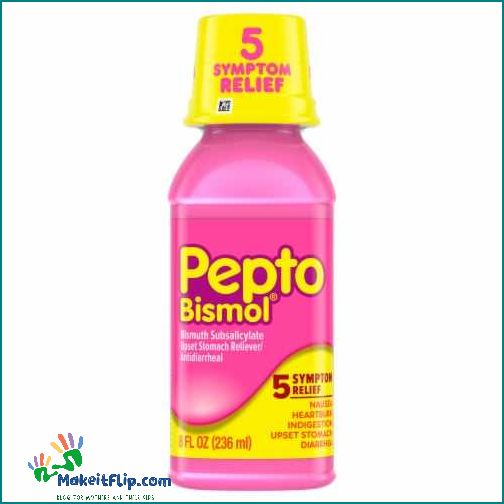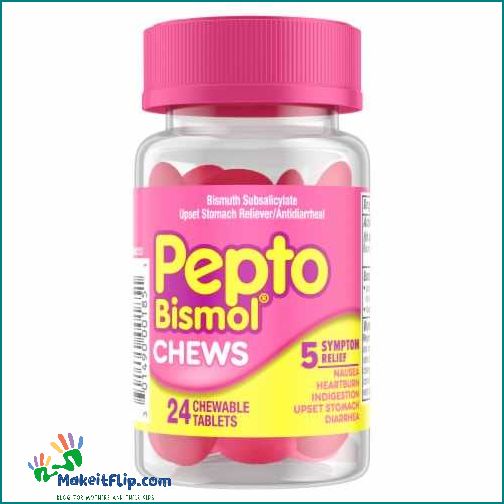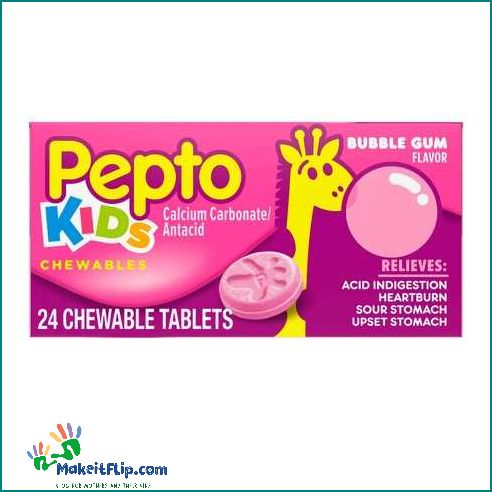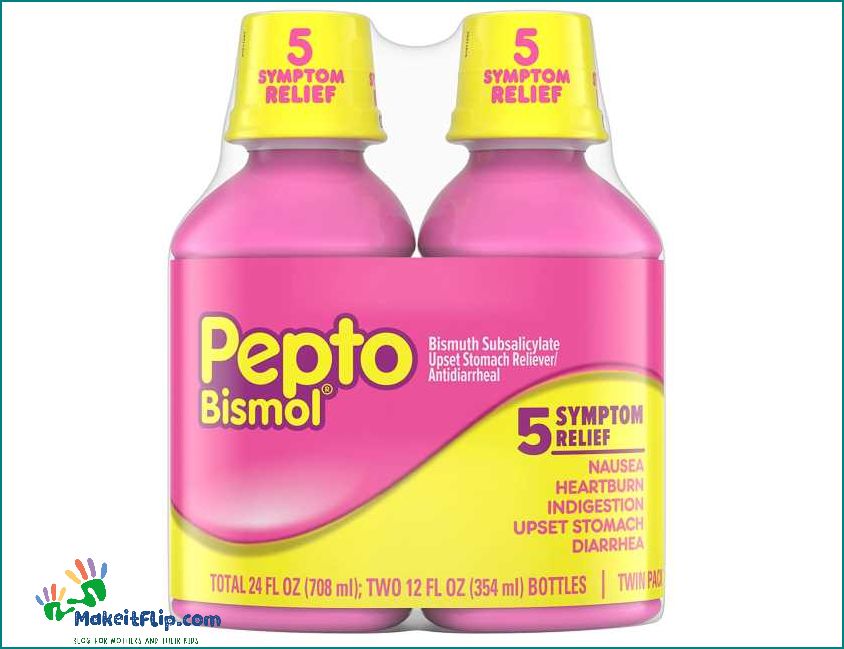Contents
Choosing the Right Antacid: A Comparison of Tums and Pepto

Heartburn and indigestion can be uncomfortable and disruptive to your daily life. Fortunately, there are many over-the-counter antacids available that can provide relief. Two popular options are Tums and Pepto, both of which are known for their effectiveness in treating digestive issues.
Tums is a calcium carbonate-based antacid that works by neutralizing excess stomach acid. It is available in chewable tablets and provides fast-acting relief for heartburn and indigestion. Tums is also a good source of calcium, which can be beneficial for those who have a calcium deficiency.
Pepto, on the other hand, contains bismuth subsalicylate and is known for its soothing and protective properties. It coats the stomach lining, providing relief from heartburn, indigestion, and upset stomach. Pepto also has antimicrobial properties, which can help fight against certain types of bacteria that can cause digestive issues.
When deciding between Tums and Pepto, it’s important to consider your specific symptoms and needs. Tums may be a better choice if you’re looking for fast relief from heartburn and indigestion, while Pepto may be more suitable if you’re experiencing an upset stomach or looking for a longer-lasting solution. It’s always a good idea to consult with your healthcare provider before starting any new medication or antacid.
Understanding Antacids

Indigestion and heartburn are common digestive issues that many people experience. They can be caused by various factors, such as eating spicy or fatty foods, overeating, or stress. When these symptoms occur, many people turn to antacids for relief.
Antacids are medications that help neutralize stomach acid, providing relief from indigestion and heartburn. They work by raising the pH level in the stomach, making it less acidic. This can help alleviate symptoms and provide temporary relief.
Two popular antacids on the market are Pepto-Bismol and Tums. Pepto-Bismol contains the active ingredient bismuth subsalicylate, which helps coat the stomach lining and soothe irritation. Tums, on the other hand, contains calcium carbonate, which works by directly neutralizing stomach acid.
When choosing between Pepto-Bismol and Tums, it’s important to consider their effectiveness in providing relief. Pepto-Bismol is known for its ability to relieve a wide range of digestive issues, including indigestion, heartburn, and upset stomach. It also has additional benefits, such as anti-inflammatory and antibacterial properties.
Tums, on the other hand, is specifically designed to target heartburn and indigestion. It works quickly to neutralize stomach acid and provide fast relief. Tums also comes in a variety of flavors, making it more appealing to those who dislike the taste of Pepto-Bismol.
Ultimately, the choice between Pepto-Bismol and Tums depends on the individual’s specific needs and preferences. Both antacids are effective in providing relief from indigestion and heartburn, but they may differ in terms of additional benefits and taste. It’s important to consult with a healthcare professional to determine which antacid is right for you.
Importance of Choosing the Right Antacid

When it comes to finding relief from indigestion and heartburn, choosing the right antacid is of utmost importance. With so many options available on the market, it can be overwhelming to make a decision. That’s why a comparison between antacids like Tums and Pepto is crucial in determining which one is the most effective for your digestive needs.
Indigestion and heartburn are common digestive issues that can cause discomfort and pain. They occur when stomach acid flows back into the esophagus, causing a burning sensation in the chest. Antacids work by neutralizing the excess acid in the stomach, providing relief from these symptoms.
However, not all antacids are created equal. The effectiveness of an antacid can vary depending on its active ingredients and formulation. Tums, for example, contains calcium carbonate, which works by directly neutralizing stomach acid. On the other hand, Pepto contains bismuth subsalicylate, which not only neutralizes acid but also provides a protective coating for the stomach lining.
Choosing the right antacid is important because it can determine how quickly you experience relief from indigestion and heartburn. Some antacids provide fast-acting relief, while others may take longer to work. Additionally, the duration of relief can also vary between antacids.
It’s also essential to consider any specific dietary restrictions or allergies you may have when choosing an antacid. Some antacids may contain ingredients that you are sensitive to or that may interact with other medications you are taking.
In conclusion, when it comes to finding relief from indigestion and heartburn, selecting the right antacid is crucial. By comparing the effectiveness, ingredients, and potential side effects of antacids like Tums and Pepto, you can make an informed decision that suits your digestive needs and provides the relief you seek.
Tums: The Pros and Cons

Tums is an antacid that is commonly used to relieve indigestion and heartburn. It works by neutralizing excess stomach acid, providing fast relief for digestive discomfort.
One of the main advantages of Tums is its effectiveness. It is known to provide quick relief from symptoms of indigestion and heartburn, allowing individuals to feel better almost immediately after taking it. Tums is also available in various flavors, making it more appealing to those who may not enjoy the taste of other antacids.
However, there are some cons to consider when using Tums. While it provides temporary relief, it does not address the underlying cause of indigestion or heartburn. This means that individuals may need to take Tums frequently to manage their symptoms, which can become inconvenient and costly in the long run. Additionally, Tums may not be suitable for everyone, especially those with certain medical conditions or who are taking certain medications.
In comparison to Pepto, Tums is specifically designed to target excess stomach acid, while Pepto provides relief for a wider range of digestive issues. Therefore, individuals experiencing symptoms beyond indigestion and heartburn may find Pepto to be a more suitable option.
In conclusion, Tums is an effective antacid for providing quick relief from indigestion and heartburn. However, it may not be the best choice for everyone, and individuals should consider their specific needs and consult with a healthcare professional before deciding on the right antacid for them.
Benefits of Tums

Tums is an antacid that is highly effective in providing relief from digestive issues such as indigestion and heartburn. Its main ingredient, calcium carbonate, works by neutralizing excess stomach acid, thereby alleviating discomfort and promoting better digestion.
One of the key benefits of Tums is its fast-acting nature. When taken as directed, Tums starts working within seconds to provide quick relief from symptoms. This makes it a convenient option for those who need immediate relief from digestive issues.
Tums is also known for its long-lasting effectiveness. Unlike some other antacids, Tums provides relief that can last for hours, allowing individuals to go about their day without the worry of recurring symptoms.
In comparison to Pepto, another popular antacid, Tums is specifically designed to target heartburn and indigestion. Pepto, on the other hand, is more commonly used for a broader range of digestive issues, including nausea, upset stomach, and diarrhea.
Overall, Tums is a trusted antacid that offers fast-acting and long-lasting relief from heartburn and indigestion. Its effectiveness, combined with its targeted approach to digestive issues, makes it a popular choice for those seeking quick and reliable relief.
FAQ about topic Tums vs Pepto Which Antacid is Right for You
What is the difference between Tums and Pepto antacids?
Tums and Pepto are both antacids, but they work in slightly different ways. Tums contains calcium carbonate, which neutralizes stomach acid and provides quick relief from heartburn. Pepto, on the other hand, contains bismuth subsalicylate, which coats the stomach lining and provides relief from heartburn, indigestion, and upset stomach.
Which antacid is better for heartburn?
Both Tums and Pepto can provide relief from heartburn, but they work in different ways. Tums neutralizes stomach acid, providing quick relief, while Pepto coats the stomach lining, providing longer-lasting relief. The choice between the two depends on personal preference and the severity of the heartburn.
Can I take Tums and Pepto together?
It is generally safe to take Tums and Pepto together, but it is always best to consult with a healthcare professional before combining medications. Both Tums and Pepto are antacids, so taking them together may provide extra relief from heartburn and other digestive issues.
Are there any side effects of using Tums or Pepto?
While Tums and Pepto are generally safe to use, they can have some side effects. Tums may cause constipation or diarrhea, while Pepto may cause a temporary darkening of the tongue and stool. It is important to read the instructions and follow the recommended dosage to minimize the risk of side effects.
Can I use Tums or Pepto if I’m pregnant?
It is generally safe to use Tums during pregnancy, as it contains calcium carbonate, which is considered safe for pregnant women. However, it is always best to consult with a healthcare professional before taking any medication during pregnancy. As for Pepto, it is not recommended for use during pregnancy, as it contains bismuth subsalicylate, which may be harmful to the fetus.
I’m Diana Ricciardi, the author behind Makeitflip.com. My blog is a dedicated space for mothers and their kids, where I share valuable insights, tips, and information to make parenting a bit easier and more enjoyable.
From finding the best booster seat high chair for your child, understanding the connection between sciatica and hip pain, to exploring the benefits of pooping in relieving acid reflux, I cover a range of topics that are essential for every parent.
My goal is to provide you with practical advice and solutions that you can easily incorporate into your daily life, ensuring that you and your child have the best possible experience during these precious years.
